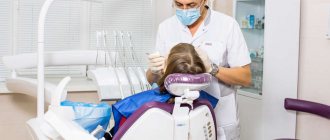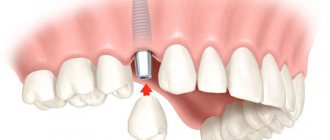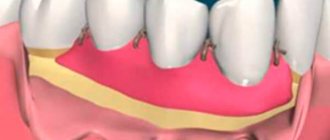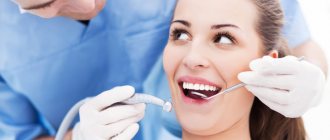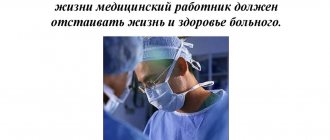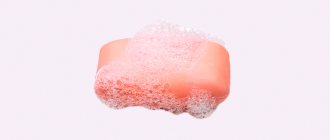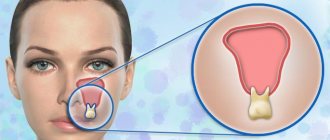A pediatric dentist differs from an adult in the same way as a general practitioner differs from a pediatrician. Of course, a specialist who works with older patients is able to provide assistance to the child if necessary. However, he is better versed in “adult” problems. But the pediatric dentist knows everything about the oral health characteristics of young patients.
The name Family Dentistry obliges. That's why we have dentists on our staff who specialize only in treating children. You can get acquainted with them in the Pediatric Dentistry section.
Pediatric dentist: what he does and what he treats
Content:
What does a pediatric dentist do?
What is special about the work of a pediatric dentist?
When should you visit a pediatric dentist?
Why do children need fissure sealing?
Diagnostics in pediatric dentistry
Why is it important to treat baby teeth?
Advice from a pediatric dentist
A pediatric dentist diagnoses, prevents, and treats oral diseases in patients under 18 years of age in a dental clinic.
Unusual doctor in a bright office
Pediatric dentistry requires the doctor to have a set of specialized equipment. For example, a comfortable chair designed specifically for young patients. Or instruments that are smaller in size than those used by regular dentists. The right atmosphere can help a child specialist become a good wizard. For this you will need:
- tools with bright handles;
- funny pictures on the walls;
- a TV with cartoons that will distract the attention of young patients during the procedure;
- songs for children;
- game Zone.
Of course, the doctor's appearance is also very important. You should forget about the usual white coat, giving preference to a bright outfit designed specifically for pediatric doctors. A specialist in bright clothes will be able to quickly win over his clients. If the doctor makes notes with a colored pen in a smart notebook, a positive atmosphere during the appointment is guaranteed!
Thus, a pediatric dentist is a very responsible profession that requires not only specific knowledge, but also some human qualities that a dentist specializing in the problems of adult patients is allowed to neglect.
What does a pediatric dentist do?
- examination of the oral cavity, filling out a dental formula;
- diagnosis and treatment of caries and its complications;
- fissure sealing;
- reading x-rays, interpreting computed tomography results;
- removal of baby teeth;
- providing assistance with dental injuries;
- carrying out professional oral hygiene;
- teaching competent home hygiene to children and parents;
- diagnosis of diseases of the mucous membrane;
- referral to dentists of related specialties (to an orthodontist to correct malocclusion).
Case from practice
How we restored a broken front incisor. A 9-year-old boy broke a permanent incisor while playing with his sister. The tooth was broken at the root, but my mother was not afraid. Having found a broken piece, she put it in milk (she read my instructions on the Internet) and rushed with her son to see me, because the sooner you see a doctor after an injury, the greater the chance of “healing” the tooth. The tooth was not only almost invisible in the mouth, but also reacted very painfully to any irritants (cold, air, touch). In this case, the pulp was exposed, but the exposure was spotty, so it was possible to maintain the vitality of the tooth (the tooth remained “alive”). This technique is quite exclusive; so far it is mainly done only abroad - only 2 mm of the pulp is removed, which allows the root to continue to “grow” immediately after the tooth has erupted. Under anesthesia, the tooth was treated with the necessary medicinal agents and the broken piece was cemented to it. Minimal participation of the dentist, minimal trauma to the tooth and the result is aesthetic, painless, durable. The patient is satisfied - what else does a dentist need? A full range of services for children is provided in the dental department of MK CELT. True professionals work here; they have their own dental laboratory, with the help of which they can perform work of any complexity in the shortest possible time. Take care of your children's health today!
What is special about the work of a pediatric dentist?
It is difficult to get young patients ready for treatment. All children are afraid of people in white coats: they associate them with injections and unpleasant sensations. They are especially afraid of visiting the dentist's office. Therefore, one of the features of the work of a pediatric dentist is the ability to find contact with all children and encourage them to undergo treatment.
Many young patients already have negative experiences at the dentist, when the doctor performed treatment through crying. These unpleasant impressions remain in the memory for a long time. When dental treatment is needed again, the child refuses to enter the dental office.
Finding contact with any child, calming him down, and conducting competent treatment are the main tasks of a doctor in pediatric dentistry.
Text checked and approved by an expert
Mikhailova Natalya Aleksandrovna
Children's dentist
20
years of experience
Children's dentistry. Treatment of caries. Treatment of pulpitis. Oral hygiene. Fissure sealing
Silver your tooth!
Yes, some clinics still offer a method of “treating” caries called “silvering.” And then the patients of these clinics come for retreatment. It would be fair to say that “silvering” teeth is not a treatment at all. This technique is indeed still widespread, although it is completely ineffective. Silver covers the beginning of caries, but does not cope, as promised, with the pathological process, which develops safely and is further aggravated under the “silver”. Teeth become stained and blackened. A few months after such “therapy”, the children again go to the doctors, but with pulpitis (at best) or with black, decayed teeth that have to be removed.
When should you visit a pediatric dentist?
Timely prevention and treatment of caries helps to prevent the development of complications (acute pain, swelling). It is recommended to take your child to the dentist from the age of 2. If nothing bothers the baby, there are no visible changes, a doctor’s examination is necessary:
- To introduce your child to visiting the dentist's office. During the examination, the little patient retains in his memory the positive emotions from visiting the doctor, because the examination is quick and painless. The inspection takes place in the form of a game.
- Pathologies of the dental system do not always have characteristic symptoms. Initial caries may not bother children, but treatment is already required.
- The doctor tells parents about the timing of changing baby teeth and how to properly perform home hygiene.
Prevention of the development of caries in primary teeth depends on how carefully home hygiene is carried out. Dental services include training in the rules of rational hygiene and individual selection of oral care products.
A visit to the pediatric dentist is necessary every six months in order not to miss the development of caries and other pathologies of the dental system.
Features of specialization
So, what knowledge should a pediatric dentist have? First of all, he must remember the timing of teething (from the very first to the “eights”). In addition, the specialist must know how to help the child more easily endure each of the stages of teething. So, the doctor may advise the parents of the baby to purchase rubber toys of a certain density, cooling or pain-relieving gel. In particularly difficult cases, a specialist may prescribe a medical procedure to open the gums in order to ease and speed up the protracted painful process.
A pediatric dentist is a person who is able to notice the curvature of permanent teeth in time and prescribe appropriate therapy. If you take care of the beauty of your smile at an early age, you have a great chance of success. It is much more difficult for an adult to correct uneven teeth. The pediatric dentist is also required to perform prosthetics on primary and primary teeth. This is one of the most popular procedures, since children quite often get injured teeth and lose them. The specialist must select the most suitable prosthesis model and give advice on caring for it.
In addition, a pediatric specialist must have knowledge regarding the removal and treatment of teeth (both milk and permanent). At the same time, his responsibilities include prescribing and selecting drugs for anesthesia, so the doctor must be well versed in contraindications, age restrictions, and dosages. By the way, the modern dental industry offers safe and effective materials for young patients, and their list is constantly growing. Therefore, a specialist must follow medical trends: know everything about children’s filling materials, adhesives, anesthetic sprays, and so on.
Also, the doctor should remind children (and if they are too small, then their parents) about the rules of oral care. They are somewhat different from those followed by adults. So, for the harmonious development of teeth, you need to give preference to solid foods. If you plan to treat your baby to vegetables or fruits, you should give preference not to mousses and juices, but to whole apples and carrots. Also, the doctor must correctly explain why you should not eat sweets. So, teeth deteriorate not from the candy the child ate, but because he did not brush his teeth after that (bacteria that cause caries develop most quickly in a sweet environment). Adult teeth are not so sensitive to caries. But children need to be monitored more strictly. A dentist helping young patients should not forget about this.
Why do children need fissure sealing?
Chewing teeth have deep grooves on their surface - fissures. They become clogged with food debris and bacteria develop. When home hygiene is inadequate, bacteria remain on the surface. They produce acid and destroy the tooth, causing tooth decay.
Prevention of caries is by sealing fissures at the dentist. It is carried out from the moment the first permanent molar erupts (from 6-7 years). The pediatric dentist carefully examines the fissures. If caries has already appeared on them, then sealing is contraindicated. It is necessary to treat caries and put a filling.
During the consultation, the doctor will tell you about all the features of the procedure, indications and contraindications.
6-7 months – 2 years
As we said, it is from 6-7 months that the first milk teeth appear, and by two years all teeth should erupt.
At this stage, age after 1 year becomes critical. It is during this period that the first caries appears, followed quite rapidly by pulpitis. What are the reasons for the occurrence of these diseases at such an early age?
Reason #1. Night feeding. Just imagine: your child drank breast milk at night (and it is very sweet), kefir, compote or juice. Remains of food or drinks literally “stick” to the teeth, and mainly flow to the upper teeth on the side on which the child sleeps (this is why we treat the upper teeth much more often than the lower ones). At night, the secretion of saliva is reduced, it is practically not produced, just like in adults.
An ideal environment arises for the development and proliferation of bacteria, which begin to gradually destroy tooth enamel, which leads to so-called caries in the stain stage. And indeed, if you look closely, white spots are visible on the teeth. Then the tooth itself begins to crumble. Caries quickly reaches the pulp...
This disease even received the honorary title “bottle caries.” However, the name of this disease is very conditional, and the word “bottle disease” should not mislead parents. That is, the cause of its occurrence can be either breastfeeding or drinking juices and compotes from a bottle or spoon.
BY THE WAY! Based on the location of bottle caries, doctors can determine which side the baby sleeps on.
Reason #2. General somatic ailments that are most often characteristic of premature babies and babies whose mothers suffered from toxicosis during pregnancy. With severe toxicosis, a woman experiences a disturbance in phosphorus-calcium metabolism, which, in turn, leads to impaired maturation of the enamel of baby teeth.
Reason #3. Lack or insufficient dental hygiene.
Solution. When caries occurs, the only treatment option is to drill out the affected tooth tissues and replace them with filling material.
If we talk about the treatment of pulpitis of chewing teeth in children, then we remove the pulp from the coronal (!) part, put in a special medicine and close it with a filling. Only in 10-15% of cases, when the nerve is severely inflamed, it is necessary to remove it entirely, clean and rinse the canals. This does not affect the rudiments of permanent teeth in any way. Physiological processes proceed as they should: the roots gradually dissolve, the baby tooth falls out, and the permanent one takes its place.
The most difficult thing is the treatment of the central upper teeth (incisors), since they take a lot of time during restoration. First, we completely remove the nerve, fill the canals with special material, and place a filling. Treatment of one tooth takes on average 30-40 minutes. Nowadays, ready-made crowns make the work easier. There are metal crowns (3M and New Smile) coated with enamel. They follow the shape of the tooth and are very durable. And their installation does not require turning or castings.
BY THE WAY: Even a carious cavity “on contact” (that is, at the point of contact with an adjacent tooth) must be treated as pulpitis - that is, with amputation (removal) of the pulp from the coronal area.
The fact is that if you treat only caries and close the infected pulp cavity with a filling (and it is impossible to determine by eye whether it is infected or not), then the missed inflammatory process will rapidly begin to develop. And after 1-2 months this tooth will have to be treated again, only this time for pulpitis.
Advice. To maintain dental health, you must first stop night feeding. The only thing you can give your baby at night is plain water. And as practice shows, children of those parents who heed our recommendations keep their teeth healthy for quite a long time.
Secondly, parents should know and remember that the appearance of the first tooth, that is, the age of 6-7 months, is the most appropriate time to begin the mandatory daily procedure of brushing your teeth. Today, in any pharmacy you can buy special toothpastes for children from 0 to 3 years old. A special brush is placed on your finger and the teeth are cleaned. The rules for brushing your teeth are very popularly explained in the instructions included with the toothpaste. And we, for our part, are always happy to show and tell how this is done in practice. After cleaning, the remaining paste is carefully removed with a napkin or... eaten by the baby (and this is completely safe!). And you need to brush your teeth, like adults, 2 times a day - morning and evening.
Thirdly, teeth with a long “life span”, and these are primarily chewing teeth (they are also the most susceptible to caries), need to have preventive sealing of fissures (fissures are depressions on the surface of the teeth that are located in the area of chewing surfaces) at the age of 2 years. It protects the chewing surfaces of teeth from caries. First, we clean (drill out) the tooth a little, and then cover it with a special compound that “seals” the tooth and protects it from caries.
And fourthly, starting from 2 years old, the child’s diet should include solid food - carrots, apples, dried bread, bagels. The fact is that the abundance of soft food does not stimulate the roots of baby teeth to resorption, and as a result, permanent teeth come out second row along with baby teeth. Solid foods also affect the formation of a correct bite. In addition, it mechanically cleans teeth. And don’t be afraid, healthy teeth won’t break because of this, since enamel is the hardest thing in the human body.
BY THE WAY: In many children, the rudiments of permanent fifth teeth are not formed at all. According to one theory, this happens precisely because in the diet of modern babies, soft food plays the “main violin”, while hard food is absent. If there is nothing to chew, why teeth?..
Why is it important to treat baby teeth?
A common misconception is that baby teeth do not need to be treated because they will soon fall out. Like permanent ones, milk ones are destroyed, hurt, and bother the child.
Why treatment is necessary:
- Caries reaches the nerve: acute pain appears, the baby’s well-being deteriorates sharply, and appetite is lost.
- If pulpitis is not treated in time, the infection spreads beyond the root and the permanent tooth germ suffers.
- Chronic infection in the mouth affects the development of the dental system and the child’s immunity.
- Inflammatory processes spread faster in children than in adults. Today caries appeared, and a few weeks later: inflammation affected the roots, swelling and severe pain appeared.
- Early removal of baby teeth before the physiological change leads to displacement of the dentition and disruption of chewing function.
Do not self-medicate, consult a doctor!
Don't wait for your condition to worsen!
Sign up
What do doctors do?
A dentist is a specialist with secondary education . After a new specialist graduates from medical school, he has the right to specialize in the treatment of hard dental tissues, dentin and enamel.
Therefore, he will not be able to help a patient who came to him with acute pain, but he has the right to perform several manipulations:
- examines the oral cavity and finds out the cause of pain;
- provides therapy for gum disease;
- fills a tooth with minor damage;
- Refers for consultation to a specialist doctor for deep caries.
If a dental specialist encounters a problem in the oral cavity that he does not have the right to solve, he must refer the person to another doctor with a higher education.
A dentist is a specialist who studied at a higher educational institution for six years and spent another year in internship. He has a wide medical specialization and can perform a variety of manipulations in the mouth:
- treat and remove teeth;
- insert dental implants;
- straighten the bite.
Few people understand what exactly distinguishes a dentist from a dentist. But knowing the different areas of dentistry will allow you to quickly find the dentist you need.
Advice from a pediatric dentist
Below are tips that will help maintain a healthy smile for a young patient under parental supervision:
- A child’s teeth should be brushed from the moment the first baby tooth emerges.
- Change toothbrushes regularly: every 1-3 months, depending on the condition of the bristles.
- Use only children's toothpaste.
- After eating you need to rinse your mouth with water.
- Control the consumption of carbohydrates: sweets, flour products, compotes.
- It is necessary to teach oral hygiene in a playful way, and also to be an example, because children repeat a lot after their parents.
- Visit the dentist every 6 months.
- When a child first complains of toothache, immediately visit a doctor to avoid complications (swelling, tooth extraction).
0-1 year
The main problem in infancy is a short frenulum of the tongue. Most often, this problem is identified by local pediatricians who observe the baby in the first year of life.
What to pay attention to: if the baby does not latch or suckle well, does not grasp the nipple or pacifier correctly, gets tired quickly, cries, does not eat enough, or loses weight, one of the reasons may be a short frenulum.
Solution. This problem can be easily corrected in a few seconds by trimming the frenulum of the tongue. At the age of up to 3-5 months, this does not even require anesthesia, since the operation is absolutely painless and bloodless, because the mucous membrane is very thin and there are no complex cords.
Advice. If the diagnosis is made, do not delay the operation so that it really goes quickly and painlessly.
Which doctor does dental prosthetics?
Let's look at which doctor puts crowns on teeth. These are the responsibilities of an orthopedic doctor, which includes the restoration of teeth, as well as their prosthetics. If the roots of the tooth are good and not damaged, then restoration is done, and if the root and tooth are not subject to further use, then prosthetic procedures are performed.
Orthopedics in dentistry is considered the most popular field. With its knowledge, you can not only successfully carry out restoration, but also restore all functional abilities.
The doctor who puts crowns on teeth is called an orthopedist. The restoration procedure includes three methods:
Crowns, bridges and inlays are used in the case of fixed type prosthetics.
A doctor who puts crowns on teeth is called an orthopedist
The fastest and easiest is the removable method. Such dentures are almost no different from real teeth, are quite wear-resistant and practical, and are affordable.
The conditionally removable method is performed if one tooth needs to be replaced. This intervention is different in that the new tooth can be easily removed by a specialist inserting teeth, but the person cannot remove it on their own.
Orthopedic dentist - description of specialty
The name “orthopedic dentistry” was given to medical qualifications for the protection, restoration and prosthetics of the maxillofacial area. Sooner or later, every person needs to protect damaged tissue with a crown or prosthetics. The rating of dentists is opened by an orthopedist.
Situations in which the help of an orthopedist is needed:
- Tooth decay and loss. In this case, its function is restored by installing an artificial one.
- Protection from destruction. If only part of the bone tissue has been corroded, and the roots are intact and healthy, a crown is installed on such dental tissue, which stops further destructive process.
- The teeth are completely intact and healthy, but their appearance does not suit the owner. Installing ceramic plates will eliminate problems such as chips and scratches.
If the tooth tissue and root are healthy, then restoration is sufficient. Otherwise, prosthetics are performed. To determine what treatment plan is needed, the doctor conducts an examination, after which he makes a dental modeling in his laboratory. The orthopedist also deals with the correction of the appearance of the dental system, i.e. issues of aesthetic dentistry.
Names for dental offices. How to name
Dentistry is one of the most successful areas of the medical business. The competition in this market segment is great, as are the opportunities. Therefore, despite the competition, specialists are trying to open their own restoration, cosmetic or medical business in the field of creating a Hollywood smile. The question of what to call your own dentistry, if not the most important, is one of the most pressing and complex. Naming is an expensive business, and not everyone at the stage of organizing a business can afford professional advice. What to do? Take advantage of the experience of predecessors.
Checking licenses
The next step is to check whether the clinic has a license to provide treatment under anesthesia and sedation (i.e., medicated sleep). Dental treatment under sedation is an increasingly popular procedure. It is harmless to children and allows them to undergo even complex treatment without fear, anxiety and crying.
Moreover, treatment under sedation is an excellent prevention of dental phobia, panic fear of dentists, due to which people lose the health of their smile, because... To the point of fainting (and this is not a joke) to be afraid of the doctor.
Dental treatment under anesthesia is a method that is also used to treat children with special needs in physical and mental development. However, for this, the clinic needs a license from the Ministry of Health of the Russian Federation and at least one full-time anesthesiologist-resuscitator.

